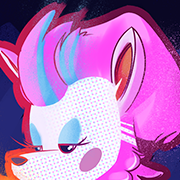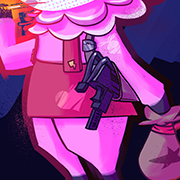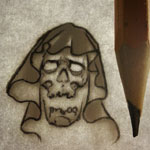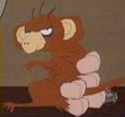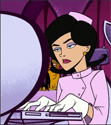|
JuniperCake posted:Also for design work in particular you don't necessarily need a class for these things (unless you thrive in a structured environment, then go for it). There are a lot of resources on the web that are very good. The important thing is if you do graphic design, do some mock ups every day, if you do web stuff, build a web site every day, etc. That's how you get good at it. When looking at postings for design jobs, all of them demand at least a couple years experience and schooling at a minimum. The only job I was able to get an interview for was one where they guy did not want to see my portfolio. I didn't take that job for a number of reasons. [ quote:And yeah it can be difficult to get into creative work and art in general is loving hard too. But if you know that's what you love then don't give up on it. Age and a family life do not mean you have to stop doing art. It's the frustration from the struggle that might get you if anything. I'm not sure your self imposed deadline to get good at your dream job is helping you out in that respect if it's causing you so much stress that you just want to quit outright. The deadline is because my husband and I agreed to start having kids around 30. And in order to afford children, a house or a car, I would need to have a full time job and start saving money as soon as possible. I just turned 27, so 30 is looking awfully close right about now. Every now and then, I get into bouts of anxiety about my art and career. I look at how far my artist friends have come and how much I've lagged behind and still draw like an 8 year old. Some people in my life are supportive and say I've come a long way and to not give up, while others tell me to look into being a secretary, legal assistant or nurse. It usually encourages me to get back into life drawing (tomorrow night) or take some beginner art classes (back in the spring). I'm consistently plagued with self doubt and sleeping problems when I'm in one of these ruts. Hopefully, I'll have a plan or a job soon and it will pass. The worst part is the anxiety makes me so restless that I can't focus on getting any of my art stuff done! It's a terrible cycle, but I'm glad it only happens once in a while.
|
|
|
|

|
| # ? May 17, 2024 01:17 |
|
Nessa posted:When looking at postings for design jobs, all of them demand at least a couple years experience and schooling at a minimum. The only job I was able to get an interview for was one where they guy did not want to see my portfolio. I didn't take that job for a number of reasons. Post your porfolio? Or if you'd rather not share it publicly feel free to PM it to me and I'll give you my honest opinion (been working for 8 years in the graphic/web/branding design industries). I'm sure it's already been said a million times in this thread, but if you want to get better at any creative skill you just need to do it and do it constantly. If you have a good sense of color and layout, I agree with Juniper that graphic design might be the easiest field to get a job in. I wouldn't recommend web design/dev as unless you're really ready to learn a lot of code you will never get a top tier job in the industry. However whichever career type you choose, start working at it all the time. Invent fictional clients for yourself and design their entire brand package. Or assign yourself a task of illustrating an entire comic book length narrative and actually do it. And consume all types of design, not just the kinds you like. If you do those things you can't help but become a better designer/illustrator/what have you. It is incredibly easy to view your work negatively, even if you're talented. I'm the type of person who hates anything they've ever designed once it's more than a month or two old, but I look back on where I was eight years ago and it is absolutely mind boggling how much better I've gotten. And that's just from working by myself and working with other people.
|
|
|
|
Nessa posted:I think I can confidently say that I have a solid eye for colour that I've developed over the years. I really don't know what I can do with that information. How can I apply that to other kinds of jobs? What other skills do I need to make a career? "Liking pretty colours" is not a career and doesn't really require any skill. I need to learn how to be good at things besides pretty colours. I know the creative industry is full of very skilled and talented people, which makes it much harder for someone like myself to find a spot in it. I need to have something to offer. Something that no one but me can provide. On the interior design industry in general, you'd probably like it. I interned for an interior design firm back in college, and it was varied, interesting work (when I wasn't doing intern bitch work like copying and collating), and the people working there came from all sorts of educational backgrounds - graphic design to liberal arts, so don't worry about having to go back to school for some overly specific area of design. Drop me a PM if you want to know more about interior design and the interior design industry.
|
|
|
|
If color is your deal, here's an off the wall suggestion: video post production. Being a colorist is a very niche industry, but can be very lucrative if you're good - and taking a crack at it is essentially free. The book to get is called the Color Correction Handbook. From there, grab yourself a copy of DaVinci Resolve Light (free) and some raw footage to play with (Google around) and see if you enjoy yourself!
|
|
|
|
Chitin posted:The book to get is called the Color Correction Handbook. Added this to my wishlist. Post-processing is the new hotness in the new gaming engines and color-correction (for the same reasons as film and TV) is a super powerful tool for unifying a game's look and feel, but I'm rear end at it, so this will be perfect. Thanks!
|
|
|
|
I had no idea! That's good to know - I wonder if the tools are similar.
|
|
|
|
I'll admit I hadn't thought of colour consulting or colour correction before!
|
|
|
|
HanzoSchmanzo posted:Not sure why this got overlooked, but your work looks quality to me. I'm not a 3D guy, so I can't say to much about your technique there, but it looks like your 2D work uses the "hue" painting method, where you paint all your values in gray scale, then use adjustment layers to add color later. Thank you, I really appreciate you taking the time to have a look.  You're right, I do paint in monochrome and then add colours after. It's a new method for me but also the one that's got the best results out of me so far. I'm definitely going to look into making the colours pop more. It's really encouraging to get a little feedback. I just applied for some Jr Artist positions and got an art test for one, and squat from the others. No job out of any of 'em. Getting noticed is really hard!
|
|
|
|
uglynoodles posted:Thank you, I really appreciate you taking the time to have a look. I think your biggest problem right now is your inconsistent level of quality in your portfolio. Your chimp 3d/paintover and Snagglechomp are great, but are significantly better than the rest of the pieces of your portfolio. I think you'd be getting more bites if you had a few more pieces in your portfolio that took you a few days to complete. Right now I see four or five pieces that may have taken you a day or two to put together, and a bunch of other pieces that look more like quick studies than finished pieces. The Waystone sketch is probably the biggest offender, as I'd expect even a Junior Artist to be able to sketch something like that out in just a few minutes. I'd try to replace it with something a bit more complete.
|
|
|
|
Gearman posted:I think your biggest problem right now is your inconsistent level of quality in your portfolio. Your chimp 3d/paintover and Snagglechomp are great, but are significantly better than the rest of the pieces of your portfolio. I think you'd be getting more bites if you had a few more pieces in your portfolio that took you a few days to complete. Right now I see four or five pieces that may have taken you a day or two to put together, and a bunch of other pieces that look more like quick studies than finished pieces. The Waystone sketch is probably the biggest offender, as I'd expect even a Junior Artist to be able to sketch something like that out in just a few minutes. I'd try to replace it with something a bit more complete. Thank you very much also! I had kept that Waystone one up because when I showed it to a local animation company it was the thing they were most interested in. It's definitely a study I can do in a few minutes, and it is somewhat old at this point too. I will get rid of it. I had the other 'simpler' pieces like the mount dinosaur up to try and show that I can do cartoony, line-based styles as well as paint, but, if it's giving the impression that my quality is inconsistent, I will nix them too!
|
|
|
|
Hi everyone. This may be a little bit of an unusual request, but I think I'm in the right place. My daughter is in middle school right now, and has loved art (drawing and painting mostly) since she was very little. She says she really wants to become a graphic artist and work on games and/or movies. Being a scientist, I have no real idea on the best way for her to prepare for this type of career, and would love some advice for how I can help set her up for success. Any helpful tips? I'll peruse through this thread as well, but if there are things you wish your parents had done for you when you were young, I would love to know! Thanks!
|
|
|
|
Day Man posted:Hi everyone. This may be a little bit of an unusual request, but I think I'm in the right place. My daughter is in middle school right now, and has loved art (drawing and painting mostly) since she was very little. She says she really wants to become a graphic artist and work on games and/or movies. Being a scientist, I have no real idea on the best way for her to prepare for this type of career, and would love some advice for how I can help set her up for success. Encourage her to draw all the time and enroll her in as many art classes as she wants. If she wants to work in games or movies she'll eventually need to know how to use Photoshop and some 3d programs as well, though someone else might be able to better suggest some good ones (I'd just point you to 3ds Max or Blender, which is free, but I have no idea how often used either are). If she's into technology she'll probably enjoy learning how to use them.
|
|
|
|
Day Man posted:Hi everyone. This may be a little bit of an unusual request, but I think I'm in the right place. My daughter is in middle school right now, and has loved art (drawing and painting mostly) since she was very little. She says she really wants to become a graphic artist and work on games and/or movies. Being a scientist, I have no real idea on the best way for her to prepare for this type of career, and would love some advice for how I can help set her up for success. I've thought about this post a while, and here's what I think. For a reference point, I have been a 3D environment artist in the games industry for 3.5 years now. I think the best things you can do for her at this point is to provide her with the opportunities, environment, and supplies to remain engaged, and to encourage her to research the broad strokes of what the industry is and what it's like to work in it. I'll explain the first point: By my observations, when an artist progresses out of childhood and into adolescence, they can suddenly get extremely frustrated with how bad they are. They start to really learn to differentiate good, quality crafted art from crappy wanna-be art, and when they produce the later, it can be crushing. They lose the fun of it and so they stop, and the only difference between a professional artist and someone who "can't even draw a stick man" is that the professional artist never stopped drawing. I guess what I'm saying is that if you want to help her have the best leg up when she finally decides as an adult to pursue art, then she needs to have fun making art! And she needs to keep making art! Drawing is a skill that benefits ANY artist in any position in any field. Other options are photography, graphic design, 3d modeling/animating, sculpting, programming (yep!)... Whatever keeps it fun. This may require some software or some classes or other overheads, and you are going to buy some stuff for her over the years that she's gonna use once and leave behind. This is part of the stage of art making that she's moving into. It's probably going to take a while for her to really get into a groove and decide what her preferences are and what she doesn't want to use, and that's ok. My second point: The sooner she can wrap her head around the basics of how movies and games are made, the sooner she can start making them! The more she can learn about how cool stuff is made, the more she can get excited about it! Also, she may discover some jobs or techniques that she didn't know about and she can start experimenting with them in her work. In any case, if she wanted to be a pro soccer player, you'd take her to soccer games and buy her books about the rules of soccer, what all the positions do, how the soccer industry works, and who are the best players, and she'll benefit from that here too. This one is a little more difficult since it will take a bit more research, but plenty of people here can recommend books and materials. I and other professionals would possibly be willing to talk to her about the industry and such. A lot in the film and games industry can and will change before she is looking to get a job, but it never hurts to start learning about things now. Hope that helps!
|
|
|
|
Thanks for the helpful replies! We have bought her many art supplies over the years, and will definitely continue to do so. My problem at the moment is knowing what to get her. I've gotten her lots of basic art supplies through the years, but it seems like there may be lots of cool stuff I don't know about. The wife and I love taking her to art museums, too. We've encountered the frustration period with guitar, but she has been stubborn and has pushed through that phase. I'm hoping to teach her the power of practice and sticking to it, and it seems to be working. So far, she still loves drawing and hasn't encountered the frustration phase, though I can imagine it may still be to come. I'll try to remain as encouraging as possible! She has a few books on drawing that the wife and I picked out, but I don't really know if we picked out good ones or not. Any suggestions on good general art books, or books focusing on aspects of the field that would be most useful to graphic artists? Supplies or materials other than basic art kits that she might have fun messing about with? Blender looks like a great way for her to try her hand at 3d modeling, thanks for pointing that out! I'm going to install it and let her mess around with it. I will pass along any questions she has about working in the industry, and I'm sure she would love the idea of talking to a real-life game developer! We've been gaming together since she was old enough to hold a controller, so it's pretty much a dream career for her. When I was getting into my field, nobody in my family had any experience, so I went in with no real guidance. I somehow stumbled into becoming successful, but I'd love to help guide her more than I was to make things easier and less scary. I'm aware that there are a lot of schools and programs in the artistic fields that are sort of scammy, and definitely want to help steer her away from that stuff.
|
|
|
|
Art books: http://amzn.com/1585429201 - This is the defacto "Drawing 101" book. It is not super flashy-fun like a cartooning book, it is more like a music theory book. An artist needs to grind through the principles in it in order to get to the point of proficiency. http://amzn.com/0671530771 - Everyone I know at college owned a copy of this. It is good and fun and silly and good. http://amzn.com/1402766785 - Classic anatomy for artists. Almost anything from Andrew Loomis. His books come from a bygone era (all of his female drawings have high heels, even the nude ones  ), but they are still touted as part of the essential library. ), but they are still touted as part of the essential library.http://amzn.com/089659498X - The animation bible. Written by famous classic Walt Disney animators Frank and Ollie, it is the first book any animator is told to buy. It is pretty thick and can be kind of imposing to crack open though. http://amzn.com/086547897X - Which is where this one comes in. Much more easy to read and not nearly as daunting, it's mostly diagrams and drawings. The principles of animation are solid enough that the 2 books don't talk against each other. The best materials for learning 3D are the ample numbers of tutorials online on YouTube, Digital Tutors, Gnomon's Workshop, and Gumroad. Some are free, some are for-sale.
|
|
|
|
This is a wonderful book to look at for color correction. I know it's very specific for achieving certain looks, but it really pushes how important color choices are, how to implement them, etc. http://www.amazon.com/Color-Correct...olor+correction Also, I don't personally have these, but take a look at them for her. They looks like they can provide a lot of inspiration, and creative insight: http://www.amazon.com/Master-Shots-Vol-Directors-Breakthrough/dp/1615931546/ref=pd_bxgy_b_img_z http://www.amazon.com/Master-Shots-Volume-Shooting-Dialogue/dp/1615930558/ref=pd_bxgy_b_img_y http://www.amazon.com/Master-Shots-Vol-2nd-Techniques/dp/1615930876/ref=pd_bxgy_b_img_z I'd highly reccommend any of the Art Of "(insert movie title here)" books you can find at your local barnes & noble. You can never have too many reference / creative / inspiration books.
|
|
|
|
jaik3n posted:This is a wonderful book to look at for color correction. I know it's very specific for achieving certain looks, but it really pushes how important color choices are, how to implement them, etc. Thanks for the advice!
|
|
|
|
If we are still recommending books, this is a classic that gets mentioned quite a bit: http://www.amazon.com/Art-Fear-Obse...ds=art+and+fear It's less a how to, and more a book for dealing with the hurdles and hang ups that many artists often face. This is probably not be a book she needs right now, but one that might be good for freshman year at an art school or something like that. It's a pretty comforting book with great advice overall.
|
|
|
|
I'm recommending Art and Fear around here so much that I have the Amazon page for it bookmarked.
|
|
|
|
I apologize if this has been discussed before. I am a copywriter with experience in digital marketing, social media, and eCommerce within the fashion industry. This is what I love to do and in addition to my full-time position I have multiple freelance connections with somewhat steady work coming in, so I imagine I'm pretty good at it. I'm interested in moving into an ad agency maybe, but I really do enjoy fashion writing. My worry is that I'm now in my late 20s and I do not have a degree. There are conflicting reports: some say that experience and quality of work is the top priority, some say that a degree is the best way to get your foot in the door. I attended college previously before dropping out to work, turning that time off into an internship and subsequent full-time position, which led to my current position at a large fashion corporation. So I guess to make a long story short. Although I'm sure it varies from company to company, is a degree truly necessary with my experience? Would I get anything from an advertising program that would bolster my resume that is worth the thousands of dollars?
|
|
|
|
district 12 posted:I apologize if this has been discussed before. I am a copywriter with experience in digital marketing, social media, and eCommerce within the fashion industry. This is what I love to do and in addition to my full-time position I have multiple freelance connections with somewhat steady work coming in, so I imagine I'm pretty good at it. I'm interested in moving into an ad agency maybe, but I really do enjoy fashion writing. I work at an ad agency and if we're hiring a copywriter and a candidate has multiple references and a good body of work, we give exactly zero fucks about a degree.
|
|
|
|
I recently received a job offer teaching digital art programs at a community center, and I'm incredibly anxious. I've never taught a class before. I spent 4 years learning graphic design at art school, but have been out of school for a little while and I'm not confident in my abilities. I'll mostly be teaching older folks, and the classes I'm teaching are in Photoshop and Final Cut Pro, two programs that I'm admittedly not very knowledgeable in. I've got a little under a month to learn them, which I'm sure I can do, but I was wondering if anyone here could offer me some advice? Specifically, anything advice/thing to read about teaching and any good advice/instructional lessons on these programs to start these classes well-informed and learned in them?
|
|
|
|
I'm looking for a bit of career and life advice as I've got one semester left of college and I'm trying to figure out what I want to do with my life. I'm 21 and I've got one semester left until I have my illustration degree from a college in South Carolina. The course work has given me a reasonable grasp on graphic design, so I feel I could make a living at a local graphic design firm, but illustration truly is my passion. My goal is to work with conceptual and character arts in film. However, I'm still very open to what I want to do, and working on games has become a greater possibility to me in the past few years. My concern is that my story is a dime a dozen and that I'm not going to be able to distinguish myself from the pack in order to make a living doing this. I feel embarrassed even telling people that I want to work in concept design for film/games as it seems to be such a cliche, even though the majority of feedback I've gotten from peers and professors is that I'd make an excellent art director. Right now my plan is to move to LA after I've saved up enough cash, maybe within a year's time, and take whatever jobs I can to make rent as I build my portfolio. If I do this, I expect to spend the next five years or so doing whatever work I can, design or otherwise, making a living as I build a portfolio that can land me steady work. Maybe I can get lucky and land an unpaid internship at a studio to help me with networking, as I realize personal connections are so important in this industry. I guess I'd like to hear from anyone with experience if this is a good idea. I'm trying to get as much advice as I can before I make any decisions, and one suggestion has been to stay in the area to build my portfolio and then make the move once I've made a name for myself. I'll admit to being a bit wavy on moving anywhere, as the big reason I'm planning on moving to LA is because my professor that I trust has told me that moving to either LA or New York is my best bet for what I want to do. I've been chatting with a former student of his that moved to LA a few years ago after he graduated. His advice was to move to LA even without a job lined up, as it wont be easy to get one if I'm not there already. He managed to find work relatively quickly and is now making a living doing advertising work. Any advice or input is welcome here. I want to get as many opinions as I can before I make any decisions.
|
|
|
|
I'm not an illustrator by any means, but if your stated goal is to "spend the next 5 years building my portfolio" then I don't see why you need to be in LA or New York to do that. Both of those places are extremely expensive and highly competitive, so they may not be the best places to find your legs as a budding illustrator. Hell, if you have an interest in video game work there are tons of other prospects, such as Seattle, Boston, Austin, or San Francisco. Those places have the added benefit of strong industries not related to entertainment, such as technology, which always have a demand for capable visual designers. As for worries of being "a dime a dozen," that's perfectly natural when you're first starting out. I think the key things are to be confident in yourself, always be improving yourself, and always be networking. You've already mentioned networking, but its importance cannot be overstated, not just for LA and NYC but everywhere and at all times. Actively pursue leads, talk to people, go to industry events, market yourself, etc.
|
|
|
|
Anony Mouse posted:I'm not an illustrator by any means, but if your stated goal is to "spend the next 5 years building my portfolio" then I don't see why you need to be in LA or New York to do that. Both of those places are extremely expensive and highly competitive, so they may not be the best places to find your legs as a budding illustrator. Hell, if you have an interest in video game work there are tons of other prospects, such as Seattle, Boston, Austin, or San Francisco. Those places have the added benefit of strong industries not related to entertainment, such as technology, which always have a demand for capable visual designers.
|
|
|
|
Ignorant Hick posted:I feel embarrassed even telling people that I want to work in concept design for film/games as it seems to be such a cliche, even though the majority of feedback I've gotten from peers and professors is that I'd make an excellent art director. That sort of comforting feedback is loving useless because there is a giant chasm between where you are and a position like that, and it is crossed only by the lucky or the talented. Pick up a copy of an ImagineFX mag and compare your work to some of the stuff in it. Then realize most of those cats are in China, they will work harder than you ever could, and you don't need to be in LA to get a contract from a company in LA.
|
|
|
|
Creative Writing Programs: Anyone ever get involved in one. I'm looking at three different ones right (Iowa, Monmouth, and Hunter). All three of them don't require GREs. I was looking at UC Riverside Low Admission program, but that's just a pipe dream. I'm curious to see if it's really worth my time do try and get involved in one in the near future.
|
|
|
|
I'm not in one, but the common advice I heard in undergrad was that you absolutely shouldn't even consider an MFA program that isn't fully funded. There are schools that offer full tuition remission, student stipends, and student health insurance, so there really is no justification for paying money for your MFA. Look at rankings, faculty, location, and look at what the requirements are for funding. Some schools will have you doing a ton of teaching, so you probably don't want a program where you have no time to actually write. Out of curiosity, why is UCR a pipe dream? I mean Iowa is on your list and that's arguably the most competitive writing program in the US (unless you mean Iowa State's program?). Do you have career goals that would benefit from an MFA? Is it something you really want to do, or is just a way to delay real life for a few more years? Not asking to be rude or anything, I've just known a few people who went into grad school for the latter reason and ended up being pretty miserable. Keep in mind all this advice is based on what I heard from people intimately involved in the MFA process a few years ago, so if anything is outdated / inaccurate, someone will probably be along shortly to correct me.
|
|
|
|
Creative writing is a little different from fine arts in general, in that having a fine art MFA might give you a slim chance of some kind of job with benefits at a school or tertiary institution. Whereas with creative writing it will help you 0% and you know that from the get go. One of my good friends did a creative writing degree but she already had a day job that paid a shitload of money and it was just "for fun" to give some structure to her writing development. In that case I'd just say go for it. But like, paying 60k for one is a pretty big pill to swallow if you're just looking to not participate in real life for a year and a half.
|
|
|
|
Day Man posted:Thanks for the helpful replies! We have bought her many art supplies over the years, and will definitely continue to do so. My problem at the moment is knowing what to get her. I've gotten her lots of basic art supplies through the years, but it seems like there may be lots of cool stuff I don't know about. The wife and I love taking her to art museums, too. We've encountered the frustration period with guitar, but she has been stubborn and has pushed through that phase. I'm hoping to teach her the power of practice and sticking to it, and it seems to be working. So far, she still loves drawing and hasn't encountered the frustration phase, though I can imagine it may still be to come. I'll try to remain as encouraging as possible! Have you played with the liquitex line of acrylics? I didn't know that acrylics could NOT suck to work with until I took a life drawing class where the professor had us use all kinds of different media. I like the liquitex basics line, but they have a lot of media (I am cheap so just use a standard gloss and slow dry medium mixed with the paint) to choose from and people tend to think the paintings I do with them are oil. I wouldn't waste money on their brushes though. I am a very messy person, so easy cleanup is another selling point for acrylics. Also get her decent brushes. I prefer flat head and filbert head brushes because I do a lot of blending and find detail work easier to do with a flat head than with a detail brush. Dagger edge brushes are are also great for lining. I think all of my favorite brushes are synthetic. Basically, the classes taught at my public schools for all grades had lovely teachers for the most part and we had communal brushes, which meant that the bristles were all kinds of hosed up. They only used heavy body acrylics that were impossible to thin down. I only had one teacher in highschool who taught analytical drawing which your daughter may or may not have had by now but is really necessary. Basically, a lot of teachers, including most of my college professors, forget to teach the basics that allow you to improve and enjoy making art. Also, drawing really big can be helpful when you are learning or improving proportions since you're drawing from the shoulder instead of the wrist. Sorry if you've already done this stuff and I've wasted time. I wish my parents were as cool as you.  JuniperCake posted:If we are still recommending books, this is a classic that gets mentioned quite a bit: I'm gonna second this since I bought it because a goon recommended it several years back and it's very helpful, as far as finding motivation when I'm stuck in a rut, which I am now. I really should go read it again. Bored fucked around with this message at 19:37 on Feb 11, 2015 |
|
|
|
Day Man posted:
You can get a student version of 3DS Max for free, and it has all the same features as a regular version. I've never used blender but I've heard it can be a pain in the rear end to learn, also it's a niche product so it doesn't have the same amount of tutorials that 3ds max does (because max is basically the industry default along with Autodesk Maya). Also check this place out for tutorials: http://www.digitaltutors.com - it costs $30 a month but is great for beginners and has a massive selection. Sure there are plenty of free tutorials on the internet, but they're mostly crap. The great thing about learning to art is that you can try it out before committing to a serious education. Ervin K fucked around with this message at 21:05 on Feb 19, 2015 |
|
|
|
So, I kind of figured this may be the best place to get some advice about this. I'm interested in becoming a Graphic Designer, but to be perfectly honest I'm not entirely sure what all tools I may need or what skills I should work on in particular. Photoshop CS6 is something I am fairly familiar with but there's definitely more I could learn, although I lack wacom/graphic tablet to use along with it. I can only assume if there's one thing I need to spend money on, it will be that. Software is a big one I imagine as well, other than Photoshop. This isn't a very in-depth post mostly because I'm starting off from scratch here and I'd rather get advice from people from a place I generally trust instead of some random article I've found. Schooling isn't entirely out of the question, but I actually have some educational things to get sorted before I can even begin to worry about that. It will likely be several months before I feel I'm prepared to take an entrance exam, and I'd rather be spending that time developing skills rather than sitting on my hands and doing nothing. I suppose I do have a question on what kind of courses I even need to take that have any bearing whatsoever for the field I'm looking to get into. There isn't exactly a 'Graphic Design' class after all. Now I am not looking towards this without realizing the field is competitive, and that I'll need to do a lot of hard work. But to be perfectly honest unless I want to be stuck working for almost unlivable wages, at companies that will physically work you to the bone, this is my best shot to better myself.
|
|
|
|
Is there any type of design you'd like to do in particular? The programs you use might change slightly, but the general answer is that you need the full Creative Suite, not just Photoshop. Each of the programs has its own job but generally speaking most workflows go like this: adjust image assets in Photoshop -> create vector illustrations or whatever in Illustrator -> bring everything together and create layout in InDesign. You don't need a tablet, they're just nice to have if you like using them. You can become proficient in all of the programs in a month or two if you're dedicated. Other than that you should start consuming all sorts of design and should start reading up on theory. I always like telling new designers to read the Vignelli canon, so you should read it!  I'm sure if you ask around others will have really great books to suggest. Thinking With Type is a good primer to typography. I'm sure if you ask around others will have really great books to suggest. Thinking With Type is a good primer to typography.Schooling is an excellent idea, but only if you're ready to put in the effort. The vast majority of design programs give you back exactly what you put into it, and you'll see a lot of students graduate with degrees and portfolios that look like they were put together by 2 year olds. I'm really curious what school you're looking at... if it doesn't have a "Graphic Design" class, you're going to the wrong one. Most larger universities and art schools will have a graphic design degree. e: Also, just start designing. Don't wait until you go to school. Don't wait until you have clients. Pick a company you think needs to be rebranded and make them a new brand, complete with stationery system and maybe a few other collateral pieces. Do this all the time. Graphic design is one of those things where learning the programs and theory will only take you so far. To become a talented designer you just have to do it all the time.
|
|
|
|
That was all incredibly helpful, thank you! I'll be sure to read over the Vignelli canon, a pleasant surprise it's right there in pdf form for me. I suppose the reason that I thought having a tablet might be helpful is that, trying to draw with a mouse is sometimes akin to pulling your own teeth out. As for your very first question... This really paints how green I am in all of this, but I'm not entirely certain on the different types of design. To put my decision into better perspective, when I was younger I had a very creative mind and my parents were actually more than willing to buy me all the things I'd need. Even had a few sets of pencils made for sketching. Over the years though I kind of fell out of it, sadly. As an adult(I'm 25 currently) I've become a lot more physical both in terms of trying to be fit but also my mindset. I kept hammering on that maybe working with my hands in a factory or a production line was actually something I'd enjoy. It might have been my most current job of working as a stocker at a grocery store which really told me how bad of an idea this was. I couldn't get the kind of job I expected because of my lack of schooling, and I could only see years of scraping by on minimum wage in my future. So I decided if I needed to work hard to claw my way out of that, I'd do it with something I know I enjoyed. Also! As for schools... These were the ones I was looking at. There is also a local community technical college that is far closer than either, I think it does actually have the right classes but they're labeled under "Visual Communication". Actually... I feel a little dumb, one of the colleges does in fact have a Graphic Design program: http://sullivan.edu/sctd/. But http://louisville.edu/ is the other school I'd looked at, while http://www.jefferson.kctcs.edu/ is the community technical college. Just working at it every day is definitely something I understand, I got a long way to go though. I had to google what you meant by a stationery system and collateral pieces!
|
|
|
|
Arthil posted:I suppose the reason that I thought having a tablet might be helpful is that, trying to draw with a mouse is sometimes akin to pulling your own teeth out. As for your very first question... This really paints how green I am in all of this, but I'm not entirely certain on the different types of design. To put my decision into better perspective, when I was younger I had a very creative mind and my parents were actually more than willing to buy me all the things I'd need. Even had a few sets of pencils made for sketching. Over the years though I kind of fell out of it, sadly. As an adult(I'm 25 currently) I've become a lot more physical both in terms of trying to be fit but also my mindset. I kept hammering on that maybe working with my hands in a factory or a production line was actually something I'd enjoy. Sounds like you might be into illustration? It's certainly a related field, but graphic design proper involves less drawing than you think. Most of the talented designers I know still sketch a lot for generating ideas, but the actual production of tangible design (eg. business cards, posters, magazines, basically anything with ink printed on it and some things without!) is done on the computer and involves very little drawing unless your design incorporates drawings or something. In fact, I think the only proper designers I know who only draw stuff are creative directors who have a bunch of lackeys to whom they can hand a sketch and say, "go and pull this together in Illustrator for me." Lucky bastards. However, working on visual designs with a Cintiq or comparable tablet can feel a lot more intuitive and rewarding than moving a mouse around, so I know what you mean. In terms of working with your hands, you can satisfy that itch with graphic design. "Working with my hands" equates to "making things" in my mind, and that's really the biggest reason why I got into design myself. I like creating stuff. I like putting a complicated system of graphics and typography and code together into a working website that solves a problem for a couple thousand people. I don't think I would get the same feeling from working on a production line. Arthil posted:Also! As for schools... These were the ones I was looking at. There is also a local community technical college that is far closer than either, I think it does actually have the right classes but they're labeled under "Visual Communication". Actually... I feel a little dumb, one of the colleges does in fact have a Graphic Design program: http://sullivan.edu/sctd/. But http://louisville.edu/ is the other school I'd looked at, while http://www.jefferson.kctcs.edu/ is the community technical college. I don't know anything about those schools, but before you give one of them your money you should ask to tour their art departments and get the names of their design teachers. Google them and see if they have portfolios and what their work looks like. However in the long run you're not going to learn a whole lot in school outside of theory and how to use the creative suite unless you go to SVA or something. As soon as you think you have something to offer a company (probably basic production skills [and by production skills I mean the ability to use the programs and make things look the way someone asks you to make them look]), get an internship and start working. You'll learn way more on the job than you will in the classroom, especially about clients.
|
|
|
|
All of this has been very helpful, kedo. I think my first step is going to get myself accustomed to the other programs in the Abode Creative Suite, then get to work on just trying to design something every day. Won't lie I'm not terribly savvy when it comes to websites, but would it be a good idea to learn the basics? As you said earlier there are different kinds of design work, and while I was very fond of illustration as a kid I'm sure I am capable of other types.
|
|
|
|
Adobe Creative Suite and other program are merely tools, try not to focus on them too much. Anyone can learn the basics of Photoshop or Illustrator in a week or two. That is not what you are paying for when you go to art/design school. What you are (hopefully) being taught is how to understand design at a fundamental level. How to critique work and know what does and doesn't work and why. If you are looking to draw and sketch and make pretty pictures, you are probably thinking more along "illustration" lines. "Design" as it is understood in zeitgeist is much more systematic than you might think. It follows certain rules, often called the elements and principles of design. In my opinion good design is 90% composition, which simply requires you to understand where and how things are placed on the page and why. Hierarchy, scale, typography, color, etc. Actually being able to draw well or use Illustrator is far less important than basic sketching, creative intuition, and a grasp of the fundamentals of design. As for formal art and design classes and schools, I would be very wary of programs that focus too heavily on the technical skills of design such as how to use Photoshop, Illustrator, etc. Anyone can become moderately proficient on those quickly. What is much more difficult and valuable it learning the fundamental theory of design and how it works. Once again, digital programs are just tools that anyone can learn; a master can pick up a piece of chalk and turn a sidewalk into perfection, the medium does not matter. In my 100% biased, subjective, and personal opinion, simply do two Google image searches, one for "swiss design" and one for "graphic design." "Swiss design" will return mostly beautiful work with an excellent sense of hierarchy and typography that qualifies as "good design". "Graphic design" will return mostly garbage with no rhyme or reason behind it. Ignore the obvious flaws in my argument and you'll understand a bit of what I'm getting at.
|
|
|
|
I think one thing I can take from that suggestion, is almost everything under the 'Graphic Design' search. Well it is as if the designer shouted out "I have ALL THE COLORS and I will use EVERY LAST ONE OF THEM!" Whereas the 'Swiss Design' seems more focused, it keeps to only one or a few colors in order to draw your eye. Which is important cause usually you're working on advertisements. But at the same time... If your client says they want every color under the rainbow, it might not be easy to dissuade them. I'm actually fairly good with composition, or at least the technical part of it. I do like working in more simple terms, a designer I rather like for instance who is actually from my home state is Richard Fonteneau as well as other designs similar to what I've seen of his. Small, to the point and usually pretty clever. Another perspective is appreciated though, I need all the help I can get. I'll still need to work with the tools in the Adobe Creative Suite, or rather get used to the ones that aren't Photoshop. I think the main thing I'll try to do is just take simple shapes and come up with something from them every day.
|
|
|
|
I'm about to pop out of school with a weird match-up of a History degree & Cartography&GIS certificate, and just rebuilt my website to make it more professional looking. Considering a lot of jobs I'm applying ask simply for a link to an online portfolio instead of submitted work it seemed necessary. http://dylanmoriarty.github.io/ I'm mostly looking for any critiques of the site, though critiques of the content would be swell as well!
|
|
|
|

|
| # ? May 17, 2024 01:17 |
|
You should probably be posting in the web design critique thread rather than here but I'll give you some quick dirty feedback. 1) Grey text on a grey background is not a very readable choice. In fact I wouldn't recommend using grey for anything at all, it's almost always ugly and plays tricks with nearby colors. Black text on a white background is fine - if you want to liven it up a bit, pick one or two colors for highlights, links, and other important bits. 2) Your footer is ruining the page by being wider than the browser window and causing some horizontal scrolling. It seems to be because of the footer's border width combined with a lack of zeroed margins. Having a border around an element that's the same color and style as the element itself makes absolutely no sense. Get rid of the border and set "margin: 0;" for your body in CSS. 3) I'm not sure if it counts as "responsive design" if the page content doesn't actually react to the window size. :P Some of your text elements respond to resizing the window, but most others do not (the banner images on your main page, the "interactive maps" tiles, etc.) To be honest you might want to move your portfolio onto Squarespace or something similar until you get a better handle on web design. It will look nicer and be easier than doing it yourself. By building your own website, you are inviting potential employers and clients to judge you based on its quality, and you really don't want that to happen unless you're a professional web designer/developer with a very nice site.
|
|
|









